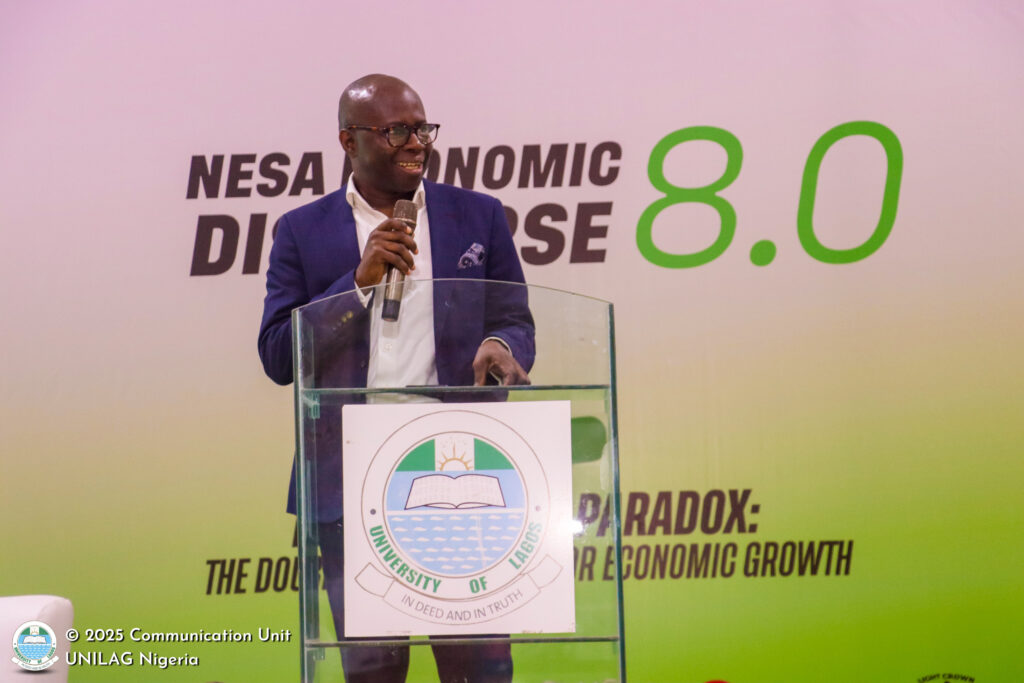Nigeria’s target to achieve balanced economic development is hinged on investing in modern technologies and infrastructure as global markets now tilts towards enhancing artificial intelligence and technology.
The managing director of Remita Payment Services Limited (RPSL), DeRemi Atanda, highlighted these developments while delivering a compelling keynote that examined the paradox of digitalisation.
At the 2025 NESA Economic Discourse, held at the University of Lagos, Mr. Atanda, with characteristic clarity and insight, challenged the audience to confront both the promises and pitfalls of digital technology as it continues to reshape industries and livelihoods.
In a gathering that ignited minds and stirred ambitions, NESA Economic Discourse 8.0 brought together the brightest students of the University of Lagos Department of Economics, lecturers, academic leaders, and digital innovators. United by purpose and driven by curiosity, participants explored the evolving contours of Nigeria’s economic future in an era defined by rapid digital transformation.
Speaking on the theme: “Digitalisation Paradox: The Double-Edged Sword for Economic Growth,” Mr. Deremi Atanda, described digitalisation as far more than a shift from manual to digital. He defined it as a transformation in how value is created – enhancing processes to unlock exponential economic growth.
He charged students to view digitalalisation as more than just an upgrade, but as powerful levers to transform systems, improve services, and create new economic value for national development.
Atanda highlighted the dual nature of digital advancement and likened it to a double-edged sword. He explained that just as a knife can cut in both directions, “digitisation carries both opportunities and risks. It powers productivity, unlocks new industries, and enhances service delivery, while also displacing jobs, disrupting markets, and deepening inequality.”
Highlighting Africa’s immense potential, he cited projections that the continent’s digital economy could surpass $700 billion by 2050.
He also referenced tangible shifts in everyday life – such as banks offering 24/7 services, digital stamp duties replacing physical counterparts, ride-hailing platforms outpacing traditional taxis, and mobile-powered ecosystems supplanting
legacy telephone and transaction infrastructures.
These, he noted, are compelling illustrations of the far-reaching disruption enabled by digital innovation.
However, Mr. Atanda was equally candid about the more troubling dimensions of this digital transformation. He cautioned that “digitalisation brings real threats such as cybercrime, privacy invasion, digital addiction, and systemic exclusion arising from unequal access.” He also raised concerns about the ethical implications of pervasive data collection and the increasing capacity to predict and influence user behaviour.
To navigate this complex landscape, Atanda urged stakeholders, especially students and young professionals, to adopt proactive strategies by cultivating a problem-solving mindset, mastering future-ready skills in design, data, and code, building resilience, initiating digital projects, engaging with tech communities, and advocating for broader digital inclusion.
He added that, “for digitisation to truly thrive, it must be one that truly transforms systems, improves productivity, and drives a change of mindset.”
Atanda also emphasised that even the negative aspects of digitalisation present unique opportunities and cited the emergence of careers in cybersecurity and ethical technology development as examples of how emerging problems can spur new professional pathways. He underscored that innovation and disruption must be guided by a strong ethical compass.





